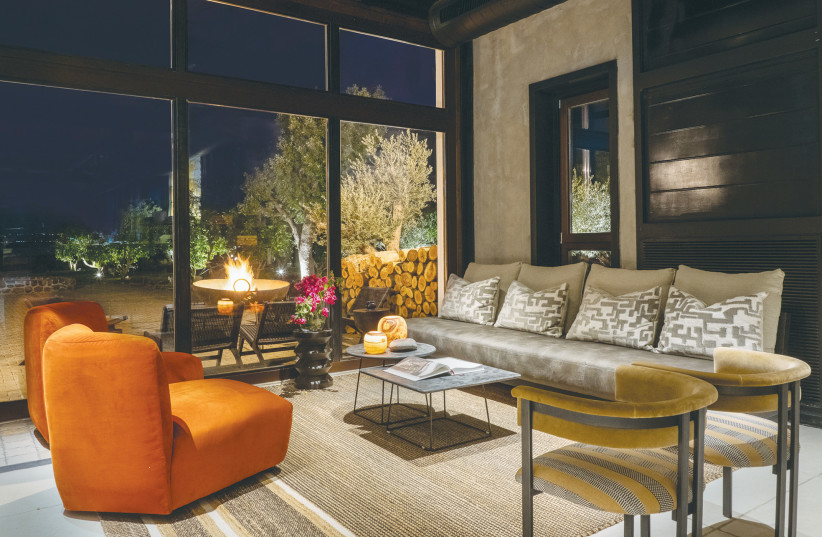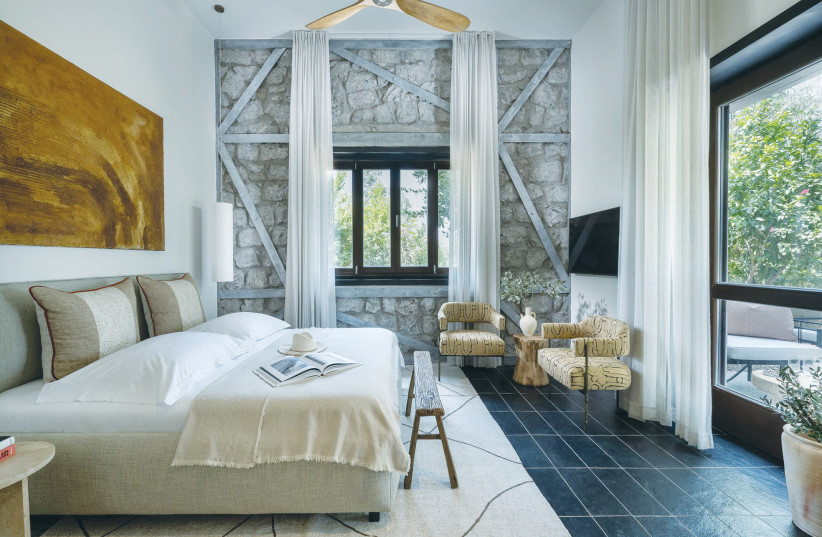Did master-spy Eli Cohen really persuade the Syrian army to plant Eucalyptus groves on the Golan Heights to provide shade for their soldiers, thus pinpointing bunkers for Israeli fighter jets to blow up?
Whether or not the legend is accurate, the trees, and the dugouts, are there until today; some of them are on the property of the recently opened Pereh Hotel– surely one of the most peaceful and luxurious spots in Israel. And, strangely, Eli Cohen is tangentially the cause.
In 1965, when Cohen was hanged in Damascus, Leo Gleser from Argentina, then 16, watched the gruesome TV footage with his Hashomer Hatza’ir friends. There and then he decided to dedicate himself to Israel. Two years later, Gleser made aliya, joined the army and had an illustrious career in the field of security.
Eventually, he started his own international security company, ISDS Ltd., and, in full circle, bought the old French Customs House, which was built at the beginning of the 20th century in Syria by the French Mandate.
The British Mandate was in power in Israel; and the proximity to the border enabled the Syrians to turn the building into the local central Syrian outpost, ringed by Eucalyptus groves. Captured by Israel in 1967, the historic site just sat there for decades, a home for land mines, tarantulas, snakes and weeds. In 2012, Gleser, struck with the beauty of the spot and its possible connection to Cohen, had the vision to preserve the elegance of the Bauhaus-style structures while turning the 28-dunam plot into a haven of peace and tranquility.

The beauty of the Pereh Hotel
To date eight of the dunams have been developed, and tranquil the site most certainly is. The no-kids policy kicks the quiet into a different dimension; the only thing that could disturb the serenity of the mountain-pond style swimming pool is an overripe olive plopping from one of the trees shading the patio.
“Pereh” means “wild” – a nod to going back to nature and blending in with earth’s bounty – but despite this, the hotel provides very definite 21st-century pampering. Next to each comfortable chair is an elegant bottle of sunscreen; fluffy towels are strategically placed at the Jacuzzi, the pool and the spa. Even the fragrance is tailored – “We didn’t want a sea-breeze scent or lemongrass,” explains Neri Eldar Terem, general manager of Pereh – who ensured that the L’Occitane infusions contained hints of jasmine and wood smoke, pertinent to the place.
Gleser’s interior designer daughter, Tamara Shafran-Gleser, worked closely with her father from day one to ensure that a stay at this haven would be practically Pereh-fect in every way. Like Mary Poppins, the pair, together with designer Dannah Leitersdorf, weaved their magic: each piece of art – all Israeli – was carefully chosen to enhance the ambiance of the lovingly restored buildings.
Handmade Bedouin carpets, wrought iron chandeliers, wooden floors, basalt stone walls in the rooms and public spaces, lush local vegetation – mangoes, figs and more drip from branches – muted lighting and soft music all pay respect to nature and the nature of this place.
In the stables-turned-lobby of the hotel, a vast Angelika Sher photograph of feasting female soldiers in a kind of Last Supper image welcomes the guests. The uniformed girls tuck into their blood-red watermelon slices with the Jerusalem hills as the background – layers upon layers of meaning hit visitors as they begin to unwind. It’s a powerful experience.
“People come here with all sorts of plans,” explains Eldar Terem, “to hike and zipline and take ATVs and choppers or climb to waterfalls,” but as they step into the Pereh zone they change their minds.

A doze by the water, a cheese and wine tasting in the hotel cellar or an hour of being pleasantly pummeled with hot-stone heaven by an outstanding hotel masseuse is more than enough for even the most adventurous tourists.
And then there’s the (no pork/seafood but not kosher) food. Tel Aviv and Belgian-trained chef Roi Dori says he is reveling in the freedom to “go wild” with locally sourced, seasonal produce – how does hydroponic leafy salad with roasted peach, mozzarella tears, hazelnuts and mustard vinaigrette appeal?
Or tabun-roasted grapes and silky beet puree with a wine demi-glace on your daily meat delight?
And, truthfully, have you ever really lived without sampling a Jerusalem artichoke crème brûlée, decorated with thyme, white chocolate and hazelnuts?
As with every inch of this crazy, magical land, Pereh is steeped in history and only-in-Israel associations: the modern kitchen is a short stroll from the extant Syrian army kitchen decorated with pictures of Sykes and Picot signing their secret agreement to split the Ottoman Empire’s rule of the region right there. The armchairs in the ultra-luxurious suites are made from the frames of Syrian bunk beds; guests stretch out on swords-into-ploughshares furniture.
Lie on a waterbed in the sparkling pool, or on the dreamily comfortable bed in the gorgeous bedroom, or wrap yourself in a toweling bathrobe and sip a martini as the sun sets and watch your cares evaporate into the cool of the evening; holidays don’t get much better than this.
Plans to expand this harmony include developing more rooms and suites on the premises and creating a glamping deluxe area with its own pool and restaurant.
The only thing that could spoil the tranquility is the price: the pampering and loveliness of the place do not come cheap. Then again, life is short, and global warming is poised on the mountaintops to smother us all.
So – if you have a special birthday coming up, or want to renew your vows and celebrate an exit, or if you just want to splash out and spoil yourself – Pereh is a perfect spot. Enjoy!
The writer, a lecturer at Reichman University and Beit Berl, was a guest of the hotel.
Peledpam@gmail.com
